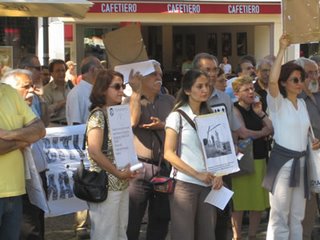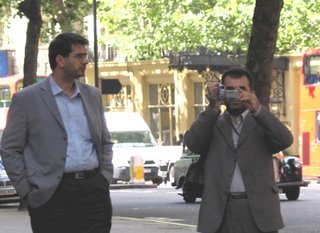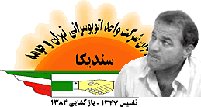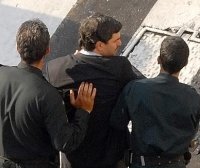Radio WBAIAmy Goodman with Ganji in an interview!
AMY GOODMAN: Akbar Ganji joins us now in the studio. Hossein Kamaly also joins us to help with translation. We welcome you both to Democracy Now! It’s good to have you with us. Akbar Ganji, welcome. Can you begin by talking about your investigations as a journalist in Iran in the late 1980s?
AKBAR GANJI: [translated] Every revolution, after it succeeds and comes to power, begins to suppress its opposition, the opposition forces. And from early on after the Iranian Revolution, my interest, my attention was drawn to the fact, to the problem with this suppression of dissidents.
And in the beginning, the new regime faced armed opposition from various forces, and there was a period of intense violence from the state toward the dissidents. And quite rapidly, the regime succeeded in oppressing and suppressing any resistance, any opposition. And in the summer of 1988, several thousand prisoners were executed.
After that, in the following decade, they started to eliminate intellectuals and journalists and writers who had no intention to engage in armed resistance, but only had their pens to express their opposition. And they were slain in the most atrocious ways. Some were cut into pieces with knives. And some of them had no political activities whatsoever. They were simply dissidents.
As a journalist and a dissident, I decided to get involved with this. It was a very difficult situation, and we exposed these killings. To say the least, what we did, in writing about the killings, stopped their continuation. However, the demands to form a truth-finding committee and to find out the root causes and the full reasons for committing those crimes never came to pass. And the people involved in the killings just got loose.
After this, my good friend, Saeed Hajjarian, there was an attempt to kill him, and the rest of us, we went to prison. And instead of the killers, we were persecuted. Saeed Hajjarian is now paralyzed and sits on a wheelchair, and the rest of us had to go to prison.
AMY GOODMAN: Your investigation, Akbar Ganji, pointed the finger at the highest levels of the -- at the time the Khamenei administration of Iran.
AKBAR GANJI: [translated] In my view, high-ranking regime officials have been involved in the killings. When I was put on trial for participating in the conference at Berlin, I named several of those high officials in my court appearance. But they never put me on trial for writing about the killings, because that file, that dossier, is so tainted and so problematic that they are scared that if I talk, so much will be exposed. Instead, they convicted me of having divulged state secrets. And, of course, state secrets, where? They meant, by that, my exposition, my expose of the killings. And also they gave me a sentence of 18 months in prison, because of what I had said against or about Mr. Khamenei.
AMY GOODMAN: We're talking to Akbar Ganji, Iranian dissident and investigative journalist, translated by Hossein Kamaly. You have just won in this country the International PEN Prize for your investigative journalism. You also were invited to the White House to talk about the situation in Iran as a leading political dissident there. You refused. Why?
AKBAR GANJI: [translated] From the beginning of my trip to the West, in Europe and in the United States, I had invitations from various heads of state and government officials to meet with them, but I declined all such invitations.
As an intellectual, I am interested and I am involved in the Civil Society Project. I engage in discussions with intellectuals and representatives of civil organizations, nongovernmental organizations. I met with Habermas, Anthony Giddens and David Hild. Tomorrow, I’ll be meeting Noam Chomsky, and on Friday, I’ll be meeting Richard Rorty.
We do not have much trust in governments, and we don't really believe that their interest is in promoting democracy and the cause of human rights. We can see what Christian, Jewish and Muslim fundamentalists have perpetrated in the Middle East by promoting war. On the other hand, we are raising the banner for peace in the world, unlike the Muslim, Christian, and Jewish fundamentalists. Our intention is to bring together the antiwar forces within Iran, from Iran and from the rest of the world, together.
AMY GOODMAN: Akbar Ganji, the U.S. has threatened to attack Iran. The President, President Bush, has called Iran a part of the axis of evil. What does this kind of pressure -- what is your response to this kind of pressure on the Iranian government that you, too, fiercely criticize?
AKBAR GANJI: [translated] We strongly oppose any military invasion against our country. First, it is impossible to invade Iran in the same manner that Iraq and Afghanistan were invaded. The most they can do is to launch missile attacks from afar or to perform pinpoint operations against. But this will not bring democracy. It will only devastate our country. And it's certainly not clear that this would bring down the tyrannical regime.
Democracy cannot be exported with the use of military invasion or with $75 million budgets. The sad situation we witnessed in Iraq is certainly more than enough. We follow a third line. And the third line says no to American foreign policy and says no to the policies of the Iranian regime. We are antiwar. We speak for peace. And in order to bring peace, we need the system in our country to become democratic. However, we are the agents of bringing that democracy, not the United States.
President Bush and Mr. Blair have already admitted that these tyrannical despotic systems have been put in place by the West, and even today that they have realized their past mistake, they intend to solve it through a military solution. But there is no military solution to the problem.
AMY GOODMAN: How can you bring democracy to Iran? How can the pro-democracy movement in Iran be empowered?
AKBAR GANJI: [translated] We have a widespread democratic movement within our country. There are two main weak points for this movement. First is the lack of organization, and there is no leadership. We need to better organize the movement and to elect democratically a leader for this movement, a leader like Gandhi. If we can manage to do this, the road to victory is short.
But we should bear in mind at least one point. Wherever in the Middle East a free election is held, Muslim fundamentalists will inevitably win. In addition to fundamental structural problems, also Western foreign policy is responsible for this. Iran is the only exception in the region. Should there be a free election in Iran, the winner will be democratic and freedom-loving forces. But those parties look at U.S. foreign policies with suspicion.
AMY GOODMAN: You are holding a protest for women in Iran next?
AKBAR GANJI: [translated] The situation of women in Iran is grave and a matter of serious concern. They suffer from two kinds of injustice: one, the injustice perpetrated by the tyrannical system equally to everyone; and then, the injustice perpetrated toward them because they are women. In the constitution of the Islamic Republic, women are deprived of several fundamental rights, also in the civil code and in the Islamic penal code. Under Reza Shah, the veil was removed by force, and under the Islamic Republic, they are forced to wear the veil.
AMY GOODMAN: And when will that protest be?
AKBAR GANJI: [translated] I’m negotiating with forces within and without the country, and it will take place within the next two weeks.
AMY GOODMAN: Akbar Ganji, I want to thank you very much for joining us, Iranian dissident, investigative journalist, held in Iran for years in prison and tortured, now speaking out in this country, refused an invitation by the White House, translated by Hossein Kamaly. I want to thank you both for being with us.
http://www.democracynow.org/

 |
|




















